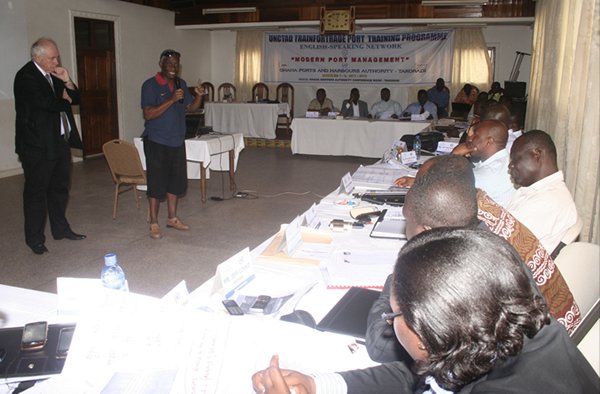According to GPHA Director-General, Mr. Richard Abugri Anamoo, the Tema and Takoradi Ports have become too small to manage the present growth in maritime business. This is why GPHA has initiated steps to reclaim about half a kilometre of sea three kilometres westward of Tema Port to secure land for expansion. The project is expected to cost about US$1 billion and will involve reclamation, dredging, the provision of breakwaters and the construction of container terminals and a cruise terminal. While such investments in land development and equipment are crucial for increasing the turnover of Tema and Takoradi ports, improving the technical management and human resources development of the two ports is as important.

Module 8: Technical Management and Human Resources Development (10-14 Sep 2012)
The fundamental objective of Module 8, entitled “Technical Management & Human Resources Development”, is to provide training on how to more effectively manage the two fundamental factors of all commercial ports: capital (port infrastructure and equipment) and human resources. These two factors are strongly interlinked and work hand-in-hand to provide the different services that ports offer.
UNCTAD assigned Mr. Kevin O’Driscoll, Director, Career Development Centre at Dublin Airport Authority, to deliver the human resource development elements of Module 8. The sections of the module focused on technical management were delivered by local experts and senior managers from the ports of Tema and Takoradi, most of whom have been trained by UNCTAD during Training of Trainers and Coaches workshops.
The vision of the GPHA is to develop Takoradi into a global oil services hub and Tema into the leading container hub of the ECOWAS region. Combined, the ports of Tema and Takoradi handle more than 90% of Ghana’s foreign trade.
The funding mechanism for the Port Training Programme is also set up to ensure sustainability. The beneficiary port communities themselves directly fund the programme and are responsible for organizing all training logistics. This self-sustaining aspect indicates the level of commitment and interest from the national port authorities – GPHA in the case of Ghana. Currently, the English-speaking network (which Ghana is part of) also receives funding from Irish Aid – Ireland’s development agency – and has built partnerships with Dublin Port Company (Ireland), The Port of Cork (Ireland) and Belfast Harbour Commissioners (Ireland).
With Module 8, the in-class training part of the programme comes to an end. Now the participants in Ghana must put into practice what they have learned and research and draft a final thesis, which they will have to successfully defend before a panel of international and local port experts in order to obtain the UNCTAD Modern Port Management certificate. This is scheduled to occur in March of 2013.
The UNCTAD Port Training Programme is organized into 4 language networks: English, French, Portuguese and Spanish. 29 ports from 6 different African and Asian countries (Tanzania, Ghana, Indonesia, Malaysia, Maldives and Namibia) are members of the English-speaking network. Overall, 71 different port entities have participated in the Port Training Programme (the four networks combined).


